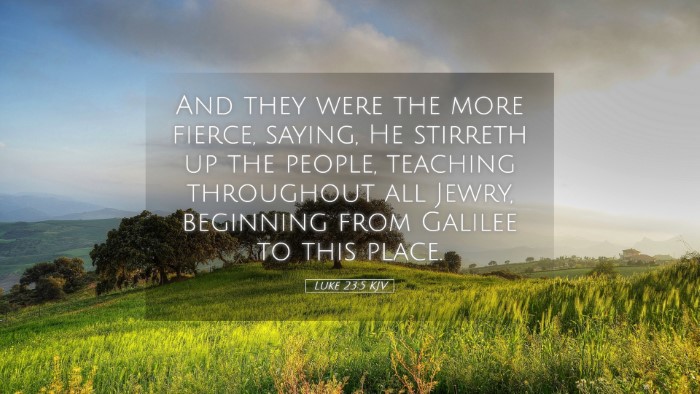Commentary on Luke 23:5
Luke 23:5 states: “And they were the more fierce, saying, He stirreth up the people, teaching throughout all Jewry, beginning from Galilee to this place.” This passage portrays the intense animosity of the Jewish leaders towards Jesus during His trial. In understanding this verse, we explore several important themes.
Contextual Background
Before delving into the specific verse, it is essential to examine the surrounding context. Jesus stands before Pilate, having been brought by the chief priests and elders who accuse Him of various crimes. This moment is pivotal, as it encapsulates the culmination of His earthly ministry and the growing tension between Jesus and the religious authorities.
Accusations of the Jews
The phrase “He stirreth up the people” highlights a significant aspect of Jesus’ ministry. His teachings had indeed caused unrest among the established Jewish order. To elaborate, we can draw insights from:
- Matthew Henry notes that Jesus' popularity was a concern for the Jewish leaders, who saw Him as a threat to their authority. They feared the consequences of His influence over the people.
- Albert Barnes emphasizes that the accusation reflects their inability to understand Jesus' mission. Rather than being a revolutionary, Jesus was a teacher who proclaimed the Kingdom of God, which they misconstrued as sedition.
- Adam Clarke points out the geographical reference to "Galilee," indicating the wide impact of Jesus' ministry, stretching from a remote region to the heart of Judea, stirring both fear and jealousy among the leaders.
Jesus as a Teacher
The title of "teacher" attributed to Jesus is profound. His role in Judea was not merely one of a healer or miracle worker; He was distinguishing Himself as a rabbi with a compelling message. This is significant because:
- According to Matthew Henry, teaching was central to Jesus’ ministry, and it incited a strong response from those who resisted His authority.
- Albert Barnes suggests that teaching throughout “all Jewry” refers to the widespread reach of His message to all Jews, not limited to particular ethnic or social groups.
- Adam Clarke notes that this teaching challenged the traditional interpretations of the law and invited a new understanding of God’s nature, which was met with fierce opposition from the establishment.
The Fierceness of the Accusers
The phrase “the more fierce” indicates the escalation of hostility among the accusers. The chief priests and elders were not merely presenting their case calmly; their fervor reflected serious concerns about Jesus’ influence:
- Matthew Henry explains that their fierceness stemmed from a desperation to maintain control over the religious landscape of Israel.
- Albert Barnes contextualizes this anger as a defense mechanism against perceived threats to their power and prestige, fueling their desire to see Jesus condemned.
- Adam Clarke highlights that their fierce demeanor indicates both moral and spiritual bankruptcy; their unwillingness to acknowledge the truth of Jesus' message demonstrated their failure as leaders.
The Implication of Galilee
The mention of “Galilee” suggests more than just geographical reference; it represents the origin of His ministry and the initial center of His following:
- Matthew Henry indicates that Galilee was often viewed with disdain by the Jewish elite, which may have added to their scorn for Jesus.
- Albert Barnes reflects on the notion that Jesus began His ministry in an area considered less significant, which further amplified the miracle of His widespread acceptance among the masses.
- Adam Clarke advises that acknowledging Galilee's role is crucial because it emphasizes that Jesus' message transcended social stratifications, appealing to the common folk.
The Theological Implications
The verse encapsulates the broader theological tensions present during Jesus' trial:
- Matthew Henry remarks that this moment signifies the rejection of divine truth by those who should have recognized it, highlighting the danger of spiritual blindness.
- Albert Barnes offers insight into the fulfillment of prophetic scripture regarding the rejection of Jesus, noting how his accusers unwittingly fulfill God's plan of salvation.
- Adam Clarke relates how this hostility serves as a precursor to the greater sacrificial act of Jesus on the cross, which demands a profound understanding of grace and mercy.
Conclusion
In conclusion, Luke 23:5 serves as a poignant reminder of the conflict between divine authority and human opposition. The fierce response of the Jewish leaders reveals their deeper spiritual struggles, while Jesus' role as a teacher emphasizes His commitment to proclaiming God's truth amidst hostility.
For pastors and theologians, this verse not only highlights the historical context of Jesus' trial but also invites reflection on current tensions within the church and society regarding the acceptance of Christ's message. It calls for a renewed commitment to understanding and teaching the fullness of the Gospel, echoing the invitation to transparency and humility inherent in Jesus’ teachings.


